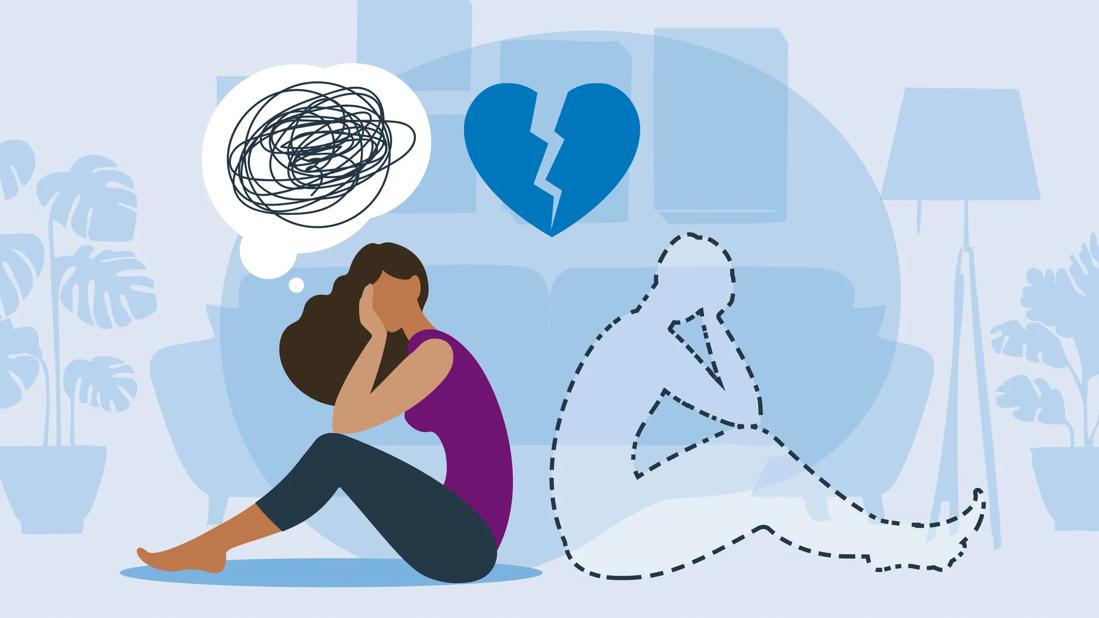Lovesickness and complicated grief often require time and healthy coping mechanisms, like talk therapy and being with friends and family

Image content: This image is available to view online.
View image online (https://assets.clevelandclinic.org/transform/3ec4ce23-f329-4ab6-a5f9-479524a87a47/person-sad-lovesick-1329759049)
Person experiencing lovesickness, with outline of missing partner and broken heart
Love can be a wonderful experience. But when relationships don’t go the way we expected, we can end up feeling lonely, defeated and even physically ill. From Shakespeare’s sonnets to modern-day romance novels, this phenomenon, often referred to as “lovesickness,” has been a familiar concept for centuries. While it certainly sounds poetic, lovesickness can have a real and profound impact on both your mind and body.
Advertisement
Cleveland Clinic is a non-profit academic medical center. Advertising on our site helps support our mission. We do not endorse non-Cleveland Clinic products or services. Policy
Registered psychotherapist Natacha Duke, RP, does a deep dive on lovesickness, looking at its various symptoms, along with sharing some strategies you can use to overcome it.
Lovesickness refers to the cluster of extremely negative emotional feelings and physical symptoms that can surface when you’re unable to be with the person you love. People who are lovesick have a really difficult time tolerating the distance from their loved ones, regardless of the reasons behind the disconnection.
“You can experience lovesickness as a result of a death, a breakup, being ghosted, having a long-distance relationship or unrequited love,” says Duke. “Often with lovesickness, there is a relationship of some sort with true feelings of love and attraction.”
As love is a very subjective experience, anyone can feel lovesickness, including those who have been married for years or anyone who experiences strong romantic emotions for someone they’ve known for only a brief amount of time. Experts say lovesickness is similar to limerence but different, in that limerence is often based on obsession, while lovesickness is often rooted in real relationships.
Some people are more inclined to have lovesickness, too, if they have a:
Advertisement
Lovesickness involves a wide variety of symptoms, ranging from intense emotions to physical ailments, including:
“Any kind of stress can have a profound impact on your body,” shares Duke. “From a behavioral perspective, there’s also a wide stretch of behaviors people turn to when they’re lovesick.”
Some common and more concerning behavioral patterns associated with lovesickness include:
Healing from lovesickness after the loss of a loved one, quite often, simply takes time.
“One would assume that at some point, after a period of mourning, you will adjust to this loss of a loved one,” notes Duke. “But if someone isn’t recalibrating or adjusting to these changes, we would call that complicated grief because we never really know how we’re going to handle the nature of that loss.”
When you’re having a hard time getting yourself out of the muck, try distracting yourself by:
“We don’t want to rely solely on distraction because then you’re suppressing your feelings and thoughts,” clarifies Duke. “It’s important, too, to have an outlet for your feelings because we often say that the only way through grief is to feel it.”
Express your feelings, thoughts and experiences on paper or share them with your friends or family. Talking to a therapist can also help improve your awareness about the situation and help you find ways to cope with emotional stress.
“Human beings need a witness to their life, so it can be helpful to find someone who can sit with you in your pain, who can be there for you if you wanted to talk or not talk,” she adds. “Having someone to care for you through your difficulty can be really healing.”
Lovesickness isn’t a medical diagnosis, but it can still have a deep impact on your mind and body because of the emotional stress and physical symptoms associated with the loss of a loved one.
“When a person isn’t with the person they love, there is physical evidence that there are functional changes we go through because of emotional stress,” says Duke. “There is enough evidence and recognition that these behavioral and physical changes are very real for the person who’s experiencing them.”
Advertisement
If you’re having a hard time getting the closure you need, talk to a therapist who can work with you to help identify possible solutions and any behavioral patterns that aren’t serving you in a healthy way.
Advertisement

Sign up for our Health Essentials emails for expert guidance on nutrition, fitness, sleep, skin care and more.
Learn more about our editorial process.
Advertisement
Communicating clear limits helps protect your time, energy and emotional well-being
Being hooked on love can cause unhealthy relationship patterns and obsessive thoughts
When someone guilt trips you, they’re using emotionally manipulative behavior to try to get you to act a certain way
This behavior is usually a sign that the other person doesn’t know how to handle conflict or is prone to being passive-aggressive
It can be harder to let go when you’ve invested time, energy and emotions — but it might be the healthier choice long term
Attachment theory suggests that your earliest relationships shape connections throughout your life
Love languages are defined by the way you prefer to give and receive affection
There are many different ways to love someone and yourself
Prioritize your health by managing stress, strengthening your social connections and getting quality sleep
Bolsters, blankets, pillows and blocks can offer extra support, stability and comfort
Allergies, postnasal drip, asthma or reflux could be to blame for a cough that won’t quit